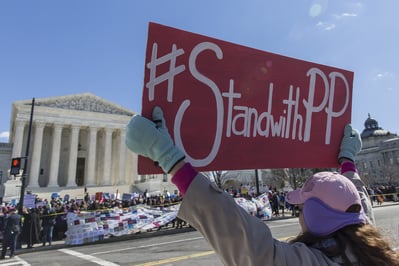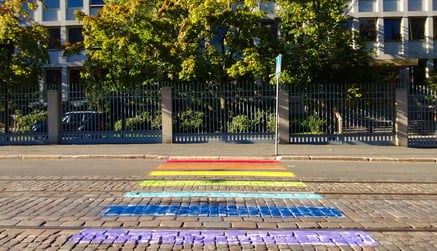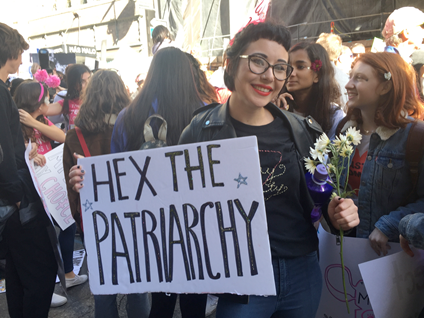On Friday mornings, I wake up at 6:45 and pack a bag of condoms, Planned Parenthood info sheets, and slips of paper in a glass jar. As a volunteer sex-ed teacher at Hope 360, a Providence high school, I begin each class by inviting students to write questions on these pieces of paper. I am very passionate about being a part of and creating space for conversations about sex and sexuality because too often, the shame that comes from silence becomes heavy and dangerous. Currently, I am working on a storytelling project for my Point Community Service Project that explores the intricacies of queer and trans hookup culture, relationships, and sex lives. My experience as a teacher has made me take a step back to think about how sex education needs to be accessible in order to be truly helpful.
Learning how to do this work has been difficult. Coming in as a student with limited teaching experience from a university that looms over Providence, these students have reason to distrust me. And as someone just a few years older than them, I am learning to straddle the line between providing dependable information and being honest about how like them, I am still struggling to understand my gender, sexuality, and the world they exist in. By the time class ends, half the pieces of paper have ended up in pockets, balled up on the floor, or scribbled with questions about penis size. But there have been some that have stopped me in my tracks, that I don't know how to answer. These questions sit on my desk, reminding me why every student deserves sex education, and why that sex-ed needs to be rethought lovingly and constantly.

1. Why don't girls masturbate?
The first casual conversation I had about masturbation was in a workshop during my first semester of college. We sat in a circle and talked about everything from sex toys to navigating masturbation when you have a roommate. I walked home in a complete daze. I considered myself a sex-positive feminist, but until I was asked to articulate my relationship with pleasure, I didn't realize how much I'd put off thinking about it.
Pleasure is difficult to talk about in a different way than STI's are. Yes, it's awkward at first, but it's also incredibly emotional. Since pleasure is so fluid, personal, and complicated, it's hard to define it without alienating someone's experience. But this question reminded me that we must attempt to talk about pleasure whenever possible, because with it, comes knowledge, empowerment, and change on a personal and powerful scale.

2. How do you know if you're gay?
When I read this, my first instinct was to make a joke about getting the queer membership card in the mail. But then I remembered being in high school, before I "accidentally" wandered into GSA meetings, before I thought I'd ever be "out enough" to be a part of communities like the Point Foundation. Really, I did just want a membership card. I needed something to prove that the slow, shame-ridden process I was going through had a definitive endpoint.
I needed this because in all the pop-culture examples I had, "coming out" was a one-time experience, and when you were gay, "believe me, you just knew." But just hearing that sexuality is fluid in a world that rejects fluidity isn't satisfying enough. This is a question part of me still wants an answer to, and part of me never wants to stop reveling in.
3. Were you sexually assaulted?
One day, I went into class with a PowerPoint entitled "Consent and Healthy Relationships." Like all my others, this was brightly colored, using a font I chose to make words like "Chlamydia" a little more palatable at 8 am. But standing in front it, switching through slides about how abuse can happen quietly, how sexual harassment is a near-ubiquitous experience for women, gender-nonconforming people, and queer people, it felt wrong. In the past year, on top of grappling with the aftermath of my own sexual assault, I've seen my university institutionalize rape culture and victim blaming. I have had conversations with students whose perpetrators are in feminist collectives, radical queer organizations, and gender studies classes. I always thought that access was the problem, and now, I don't always know what to think.
At this point in the class, I visibly froze up. We had about 10 minutes left to go. I wanted to leave with some word of advice that would prevent what I knew was bound to happen (or has already happened to) a significant portion of us in the room. But in that moment, it all just felt so unmanageably heavy. When I unfolded this question after class, I knew the answer had two pieces: the yes I am trying to own and the "stop talking about it" that lingers. It occurred to me that this constantly-unanswerable question is something way bigger than myself or this classroom.

NBCUniversal Point Scholar Julia at the Women's March LA
This work makes me grateful for my 11th grade teacher who pulled a condom over her arm to give us a response to anyone claiming to be "too big." It makes me grateful for every almost-conversation about masturbation I had at high school sleepovers. And most of all, it makes me grateful for questions like these. Ceaselessly asked, potentially unanswerable, and well-worth talking about anyway.

This post was written by NBCUniversal Point Scholar Julia Horwitz.
Julia is currently a student at Brown University studying English. As a queer woman, Julia feels that it is her responsibility to tell her story as honestly and often as possible, since LGBTQ representation in the media is minimal and often inaccurate. Read more about Julia here.

